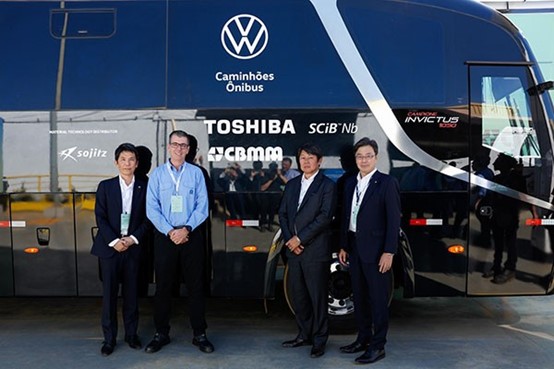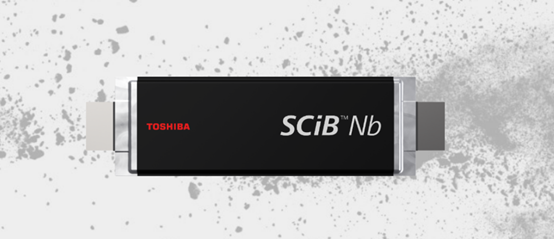On June 20th, Toshiba Corporation of Japan announced that the company, in collaboration with Sojitz Corporation and the world-leading niobium producer, Brazilian Niobium Miner CBMM, has completed the development of a lithium-ion battery with a niobium titanium oxide (NTO) anode and launched a prototype electric bus equipped with this battery at the launch ceremony. This prototype can achieve an ultra-fast charging time of about 10 minutes and has increased the energy density by about 50%, reaching 130 Wh/kg. The electric bus has begun testing and demonstration operations at CBMM's factory in Araxá, Brazil.
This is the world's first prototype electric vehicle equipped with an NTO niobium-based anode lithium-ion battery, further paving the way for the commercial application of such batteries. The three companies will continue to collaborate and maximize the use of their respective technologies and knowledge to launch the next generation of NTO anode lithium-ion batteries in the global market by the spring of 2025.

Toshiba, Sojitz, and CBMM launched the fast-charging electric bus prototype equipped with NTO anode lithium-ion batteries at CBMM's factory in Araxá, Brazil.
This NTO battery-equipped electric bus was developed by Volkswagen Truck & Bus, Brazil, with Volkswagen being a leading company in the development and large-scale production of electric trucks in the Latin American region. The prototype electric bus will also undergo testing at CBMM's industrial plant to provide relevant test data on the characteristics of the NTO battery and vehicle operation, and to support the parameter adjustments needed for commercialization.
According to Toshiba, the theoretical volumetric density of NTO is twice that of the graphite-based anode commonly used in lithium-ion batteries. This prompted the three companies to sign a joint agreement in June 2018 to explore the potential of NTO niobium-based anodes. Subsequently, in September 2021, the three companies signed a joint development agreement to extend cooperation to the large-scale production process of the next generation of batteries, mainly targeting the application of commercial electric vehicles. In August 2023, the three companies signed an extensive joint sales and marketing agreement covering the establishment of supply chains and the promotion of sales and marketing activities. Then, in May of this year, at a ceremony attended by representatives of the Brazilian and Japanese governments, the three parties signed a memorandum of understanding on strengthening supply chains and business promotion.
Previously, Toshiba's niobium-based anode battery was tested in electric vehicles such as the Mitsubishi i-MIEV and Honda Fit EV. However, buses and engineering vehicles seem to be a better field of application. Because this battery can operate at temperatures ranging from -30 to +60°C, it can achieve more than 10,000 cycles with the original capacity still exceeding 80%, and can be charged to 80% in just 10 minutes. Although its energy density of 130 Wh/kg (307 Wh/l) is not enough to compete with high-energy-density ternary or iron-phosphate batteries in pure electric vehicles, it has taken a step forward for the previous generation of electric buses equipped with SCiB batteries.

Toshiba's Vice President of the Battery Division, Toshihiko Takaoka, stated that the SCiB™Nb battery equipped with an NTO anode, used in the electric bus application, not only provides a higher energy density but also enables fast charging, thus realizing the practical application of niobium in battery materials. Toshiba will continue to develop niobium-based anode batteries to expand the product lineup and business of SCiB™ batteries.
Sojitz's Senior Managing Executive Officer and President & CEO of the Americas, Koichi Yamaguchi, stated that as one of the shareholders of CBMM and the exclusive agent of CBMM in the Japanese market, Sojitz has been building a stable raw material supply system and cultivating market applications. Through this demonstration, the NTO battery will bring a new solution to the market for the electrification of mobility and other applications. Sojitz will play an important role in supply chain management and accelerate business development, including sales activities, by utilizing its global sales network and operational advantages in various industries.
CBMM's Technical Lead for Battery Projects, Rogério Ribas, stated that the use of niobium oxide in the anode of lithium-ion batteries brings special characteristics to this component. Since this material carries lithium at an inherent stable voltage, the battery is safer and more efficient. Moreover, due to its open crystal structure, which facilitates the insertion of lithium, it can be fully charged in less than 10 minutes without damaging the battery. Due to these unique characteristics, niobium-containing batteries are safer and have a longer lifespan than traditional batteries.
Toshiba, with a history of nearly 150 years, is a global company group that combines energy, social infrastructure, electronic devices, and other business fields with information processing, digital, and artificial intelligence technologies to help achieve carbon neutrality and the future circular economy. The Toshiba Group has 105,000 employees worldwide and achieved sales of 3.3 trillion yen (150 billion RMB) in the fiscal year 2023.
Sojitz Corporation, formed by the merger of Nichimen Corporation and Nissho Iwai Corporation, both with a history of over 160 years, currently engages in a wide range of businesses including manufacturing, sales, import, and export of various products, in addition to providing services and investments in diversified businesses worldwide. The Sojitz Group has about 400 subsidiaries and affiliated companies in Japan and around the world.
Brazil's CBMM is a global leader in the production and sales of niobium products, with over 500 customers in 50 countries. The company is headquartered in Brazil, with regional offices in China, the Netherlands, Singapore, Switzerland, and the United States, providing products and technologies for infrastructure, transportation, aerospace, healthcare, and energy sectors. The company has a new business front, supporting its growth plan by developing new applications to accelerate the entry of niobium technology into the global market. Over the past five years, CBMM has made strategic investments aimed at developing new niobium materials for lithium-ion batteries. Since its establishment, CBMM has carried out projects in Brazil and various countries around the world to promote the adoption of niobium technology in multiple industries.
Toshiba's Niobium-based Anode Lithium-ion Battery Cell Product Specifications:
-
Product Name: SCiB™Nb 50Ah Battery
-
Rated Capacity: 50 Ah
-
Rated Voltage: 2.3 V
-
Output Power: 1000 W (SOC 50%, 10s, 25 °C)*2
-
Input Power: 2000 W (SOC 50%, 10s, 25 °C)*2
-
Volumetric Energy Density (Volumetric Energy Density*1): 350 Wh/L (307 Wh/L)
-
Gravitational Energy Density: 130 Wh/kg
-
Dimensions (including terminals and packaging): 98 x 280 x 12 mm (102 x 310 x 12 mm)
-
Weight: Approximately 860 g
-
Fast Charging Performance: 5C Charging (10 minutes, SOC 80%)
-
Operating Temperature: -30 ~ +60 °C
-
Cycle Life: 10,000 cycles
Recently, UK battery materials company Echion has also established a long-term partnership with Brazilian niobium producer CBMM and will open a 20,000-tonne niobium-based XNO® manufacturing plant this year, capable of supporting the production of 1GWh of batteries.







